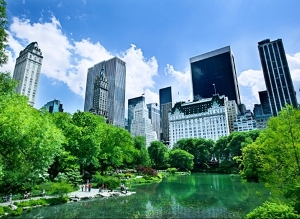Workshop talks green growth
 |
The workshop, Sustainable cities: Challenges and Opportunities, discussed how to achieve long-term and sustainable development for cities and outlined resources and strategies.
Vietnam is facing challenges as a result of booming cities and vigorous urbanisation, said Minister of Construction Trinh Dinh Dung.
The key challenge is how to support economic growth while controlling the ecological and social impacts associated with urbanisation, as well as improving quality of life.
"The government will establish a system of sustainable urban centres with suitable capacity and diversity across the country," Dung said.
Vietnam Chamber of Commerce and Industry president Vu Tien Loc said the role of the business circle is important in the process.
"Our business community has already realised the necessity of developing sustainable and prosperous urban centres, thus increasing the competitiveness of the national economy and local business," he said.
Siemens CEO for ASEAN-Pacific Cluster Lothar Herrmannsaid one in two people worldwide currently lived in a city. According to recent forecasts, he said, there will be 2 billion new city dwellers by 2030 and roughly 60 per cent of the world's population will be living in urban environments.
In addition to their increasing economic importance, urban centres are responsible for rising demand for energy and resources around the world, Herrmann said.
They consumed around 75 per cent of the world's energy and about 60 per cent of the world's freshwater, and produced more than 80 per cent of all greenhouse gas emissions, mostly carbon dioxide.
The vigorous development of cities caused enormous infrastructure challenges for decision-makers and urban planners.
Not only is it important to guarantee a high quality of life for city dwellers, Herrmann said, but also to ensure that cities remain economically competitive and that resources are handled responsibly.
What the stars mean:
★ Poor ★ ★ Promising ★★★ Good ★★★★ Very good ★★★★★ Exceptional
Latest News
More News
- Hermes joins Long Thanh cargo terminal development (February 04, 2026 | 15:59)
- SCG enhances production and distribution in Vietnam (February 04, 2026 | 08:00)
- UNIVACCO strengthens Asia expansion with Vietnam facility (February 03, 2026 | 08:00)
- Cai Mep Ha Port project wins approval with $1.95bn investment (February 02, 2026 | 16:17)
- Repositioning Vietnam in Asia’s manufacturing race (February 02, 2026 | 16:00)
- Manufacturing growth remains solid in early 2026 (February 02, 2026 | 15:28)
- Navigating venture capital trends across the continent (February 02, 2026 | 14:00)
- Motivations to achieve high growth (February 02, 2026 | 11:00)
- Capacity and regulations among British areas of expertise in IFCs (February 02, 2026 | 09:09)
- Transition underway in German investment across Vietnam (February 02, 2026 | 08:00)
















 Mobile Version
Mobile Version